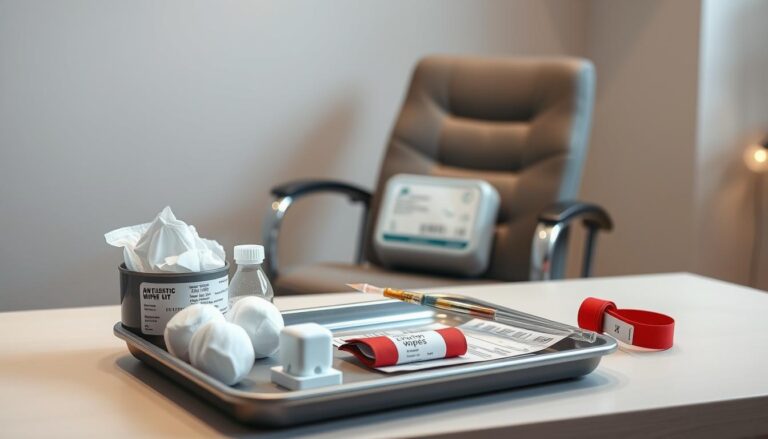Why Preventive Healthcare Services Are Essential for You
Are you taking steps to protect your health? Preventive healthcare is key to a longer, healthier life. It helps spot health issues early and promotes healthy living. This way, we can lower our risk of serious diseases like heart disease, diabetes, and cancer.
Preventive healthcare includes many services. These range from routine tests and shots to advice on healthy living. Even though only 8% of adults in the U.S. aged 35 and older got the recommended care in 2018, its benefits are clear. It helps us stay healthy, find problems early, and saves money on medical costs later.

Key Takeaways
- Preventive healthcare services can help identify potential health issues early, before they become more serious and difficult to treat.
- Regular screenings, immunizations, and healthy lifestyle choices are crucial for maintaining overall health and well-being.
- Preventive care can save money by reducing the need for expensive treatments and hospitalizations for chronic conditions.
- Preventive healthcare is accessible and affordable, with most insurance plans covering the full cost of these services.
- Incorporating preventive care into your routine can lead to longer, healthier lives for you and your family.
What is Preventive Healthcare?
Preventive healthcare is about getting regular care to keep us healthy and catch health problems early. It includes screenings, shots, and advice to stop chronic diseases and illnesses. This helps us avoid serious health issues.
Definition and Importance of Preventive Care
Preventive care is key to finding health problems early, when they’re easier to treat. It helps us avoid chronic diseases and expensive treatments. This way, we can live longer and healthier lives.
World Health Organization (WHO) data shows that in 2011, 55 million people died worldwide. Two-thirds of these deaths were from non-communicable diseases. Many of these could have been prevented with early healthcare.
Preventive healthcare services tackle many health concerns. They include screenings for diseases like high blood pressure and cancer. They also promote healthy living through shots, good nutrition, and exercise. By focusing on our health, we can improve our lives and reduce healthcare costs.
Many Americans find it hard to afford basic healthcare. The 2011 National Health Interview Survey found that 1 in 3 struggle to pay for food and medicine. Preventive care helps by tackling health issues early, saving money on expensive treatments later.
Types of Preventive Healthcare Services
Screenings, Immunizations, and Counseling
Adults can get many preventive healthcare services. These include screenings, immunizations, and counseling. They help find health problems early and keep you well.
Screenings like mammograms and colonoscopies check for cancers. Blood tests look for diabetes and high cholesterol. Shots like flu vaccines and COVID-19 vaccines boost your immune system.
Counseling helps you quit smoking and eat healthier. It guides you to make choices that lower disease risk.
Kids get preventive care too. This includes check-ups, shots, and tests for behavior and growth. It helps them stay healthy and grow well.
| Preventive Service | Recommendation |
|---|---|
| Mammograms | Annually for women over 40 |
| Colonoscopies | Every 10 years starting at age 45 |
| Flu Shots | Annually for everyone 6 months and older |
| COVID-19 Vaccines | Primary series and boosters as recommended |
| Well-Child Visits | Recommended regularly from birth to age 21 |
Why Preventive Healthcare Services Are Essential for You
Choosing preventive healthcare is a smart move for your health. It helps you stay well and feel good. Regular visits and tests can improve your health, prevent serious diseases, and boost your overall well-being.
Early detection is vital for good health. Issues like high blood pressure, diabetes, and certain cancers might not show symptoms early. That’s why preventive screenings are key for catching problems early. This can lead to better treatment and save money in the long run.
Preventive care also helps your mental health and boosts your self-esteem. Taking care of your health gives you peace of mind and lets you live fully.
Healthy habits like weight management, regular exercise, and a balanced diet are key. They lower your risk of heart disease and diabetes and help you live longer and more productively.
Investing in preventive healthcare means investing in your future. By focusing on your health now, you’ll enjoy a healthier, happier, and more fulfilling life for years to come.
Preventive Care for Children
Preventive healthcare is key for our kids, just like it is for us. Regular visits, vaccinations, and screenings are vital. They help track growth, spot issues early, and protect against diseases.
Well-child visits are important. They check on physical, behavioral, and cognitive growth. These visits happen at 12, 15, 18, 24, and 30 months, then yearly until age 10. Vision tests start at 3 years, with more at 4 and 5. Hearing tests begin at 4 years old.
Screenings and tests are also part of preventive care. Kids at risk of high cholesterol get blood tests between 2 and 10 years. All kids get a cholesterol test at 9-11 and again at 17-21. TB risk is checked at every visit, and some kids may need tests for anemia or lead levels.
Injury prevention is also key. For toddlers, this means using the right car seats and avoiding dangers like window cords. As kids get older, they need booster seats, seat belts, and protective gear for sports. They also learn safe ways to cross streets.
Most preventive care for kids is covered by insurance, including Medicaid and CHIP. This means all families can get the care their kids need.
Importance of Family Health History
Our family health history can greatly affect our risk for certain chronic conditions. If a close relative has diabetes, heart disease, or cancer, we might need to get screened earlier or more often. Knowing our family health history helps us take proactive steps in preventive care.
Genetic Risk and Tailored Preventive Care
This might mean getting screened at a younger age or more frequently than others. Being aware of our family health history also helps us make healthier lifestyle choices. This can lower our risk of getting those conditions.
A family health history should cover three generations. It includes children, siblings, parents, aunts and uncles, nieces and nephews, grandparents, and cousins. Genetic backgrounds and shared environments can give clues to conditions that may run in a family.
Healthcare professionals can use this information to assess risks. For example, heart disease, high blood pressure, stroke, certain cancers, and type 2 diabetes are more common in families with a history. Family health history can also highlight risks of rarer conditions like cystic fibrosis and sickle cell disease.
| Condition | Risk Factors Based on Family History |
|---|---|
| Heart Disease | Increased risk if a close relative had heart disease, especially at a younger age |
| Cancer | Higher risk if a close relative had certain types of cancer, especially if diagnosed at an early age |
| Diabetes | Greater likelihood if a parent or sibling has type 2 diabetes |
| Osteoporosis | More common if a parent or grandparent had a history of bone fractures |
People with a family history of a disorder are at higher risk but not guaranteed to get it. Those with no family history can still be at risk. Healthcare providers might suggest more frequent screenings for certain cancers based on family history.
Regular checkups and tests, along with lifestyle changes like a healthy diet and exercise, can help prevent common illnesses. Talking to relatives about their health can provide important information for a complete family health history.
Conclusion
Preventive healthcare is key for our health and well-being. It includes routine screenings, immunizations, and counseling. This helps us catch health problems early and prevent serious diseases.
Preventive care boosts our health outcomes and lightens the load on our healthcare system. It also helps make society more equitable.
Even though getting preventive services can be hard, education and policy changes can help. Regular health checkups let us find risk factors and create personalized strategies to lower disease risk.
This leads to improved overall health, better disease management, and healthier lifestyles.
Investing in preventive healthcare is a smart move for our long-term health. It helps us stay good health and quality of life. By focusing on preventive care, we can live longer and healthier lives.







